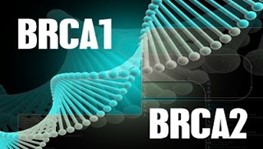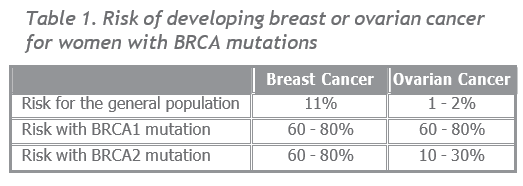Hereditary breast and ovarian cancer syndrome is a type of familial cancer, and is linked to mutations in two genes called BRCA1 and BRCA2. BRCA1 and BRCA2 are known as tumour suppressor genes – they prevent cells from growing too rapidly or in an uncontrolled way. Thousands of mutations have been found in these genes, but only some have been linked to an increased risk of cancer.
Inheriting one of these mutations in BRCA1 or BRCA2 increases your risk of developing breast, ovarian and certain other types of cancer. Not all cases of breast or ovarian cancer are associated with mutations in BRCA1 and BRCA2. In fact, only 5 – 10% of breast cancer cases and 10 – 15% of ovarian cancer cases are due to mutations in BRCA1 and BRCA2.
Cancer occurs when cells in your body start to grow out of control. These cancer cells can multiply very quickly, cause growths or tumours, invade surrounding tissues, and even spread (metastasize) to other areas of the body. Cancer is a complex disease that can be caused by several different factors. A few types of cancer run in families and this is called hereditary or familial cancer. Hereditary cancers have been linked to changes in genes (called mutations) that can be passed from parents to their children. All genes come in pairs, and your cells need both copies to work normally. One copy of each gene is inherited from your mother, and the other copy from your father. When you inherit one gene with a mutation it increases the risk of you developing that particular cancer, but it does not necessarily mean that you will develop cancer. The other copy of the gene without the mutation can keep your cells from growing out of control. But when the normal copy of the gene is damaged by other factors such as chemicals, radiation or smoking, the risk of developing cancer increases further. Many of the factors that can damage genes are still unknown.
Women with a BRCA1 or BRCA2 mutation are also at increased risk of cancer of the fallopian tubes, pancreas, and peritoneum (the membrane that lines the abdomen and the organs in the abdomen). Men with a BRCA1 or BRCA2 mutation are at increased risk of cancer of the breast, prostate and pancreas.

BRCA1 and BRCA2 gene mutations are found more commonly in certain ethnic groups, including Ashkenazi Jews, Afrikaners, French Canadians and people of Icelandic backgrounds, but they can occur in anyone.
A genetic risk assessment and potential BRCA gene mutation testing is recommended if you have any of the following:
It is strongly advised that you should have genetic counselling before and after testing for any cancer- related gene mutation. This will help you to understand which specific blood test is needed based on your personal and family history, how the test is done, what the test results mean, and help you to set up a management plan or protocol based on your results.
If a known cancer-associated mutation is found in a BRCA gene, you have an increased risk of developing cancer (see Table 1). It does NOT mean that you will get cancer. No test can tell with absolute certainty that you will develop cancer. Additional breast cancer preventive strategies, such as enhanced screening tests, medication and surgery should be discussed with your genetic counsellor and healthcare provider.

Having a BRCA mutation does mean that you can pass the mutation on to your children. Each child has a 50% chance of inheriting their parent’s BRCA gene fault. Your siblings may also have inherited the BRCA gene fault.
Lancet Laboratories offers genetic counselling by a clinical geneticist, Dr Karen Milstein. For further information please contact 011 358 0800.
Richmond, Johannesburg,
2092